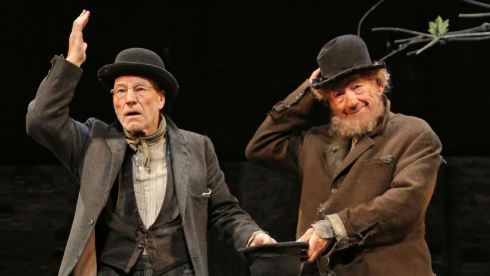"There is no lack of void," Estragon/Didi explains to a cruel world. While his laments strike both a humorous and disturbing chord, the current Broadway revival at the Cort Theater of Waiting For Godot is never less than riveting.
That's thanks to the extraordinary chemistry between Ian McKellen as Estragon and Patrick Stewart as a determined, upbeat Vladimir/Didi. The duo is theatrical magic, ably assisted by a bombastic Shuler Hensley as Pozzo and Billy Crudup as the abused, oddly named Lucky.
Granted, this is a bleak landscape of loneliness and despair, as there is little evidence of either God or humanity. Boredom, indifference and senseless violence permeate Didi's and Gogo's existence. What saves them is Beckett's insistence on pairing. Be it Happy Days or Godot, friendship and affection are a bulwark against a harsh reality where all is apparently lost.
Seamlessly directed by Sean Mathias, the two vaudevillian clowns, Stewart, the take-charge adult, and McKellen, the impish child, entertain and comfort each other. Such affection is all that stands between them and annihilation. "What's the good of losing heart now, that's what I say," notes the spry Vladimir.
Conversely, the noted pair has a more problematic relationship in Harold Pinter's No Man's Land, playing in repertory with Godot at the Cort. The same quartet performs excellently. But here, Pinter's signature menace, his insistence on male power struggles via sexual politics, is coupled with the unnerving sensation that one's never sure what is real.
Set in an upper-class London drawing room, Stewart is Hirst, the successful man of letters, while McKellen's charming poet Spooner is more whimsical. "I never stay long with others," he explains, openly alarmed if someone likes him.
It's not clear initially if the men know each other; later, they spar as old acquaintances. As in The Homecoming and Betrayal, currently playing down the street, the battle for male supremacy, fought largely in the bedroom, trumps class and the outward signs of success. The leads circle each other like drunken panthers, yet the need to connect, however perversely, remains.
Into this strangely captive atmosphere, a veritable no man's land where day and night, freedom and captivity blur, secrets and infidelity are revealed. The threat of violence from Foster (Billy Crudup) and Briggs (Shuler Hensley), both sporting lower-class British accents, is ever present. Do they work for Hirst? Are they dominating him? Hirst seems to wither before them, yet is the consummate attack dog solo. The battle of wits between Stewart and McKellen, whatever the mystery, is a wonder to behold.
There are some shared themes in the Pinter and Beckett plays; yet Godot is slightly more optimistic. Pinter's biting humor can't disguise the discontent and malice that infect the atmosphere. "Experience is a paltry thing," muses Spooner. The prevalent sense of disorientation in No Man's Land leaves its audience in limbo. Both productions, deftly staged, posit the existential meaning of life, though you may exit Godot, despite its end-of-the-world set, with a scintilla of hope.
Photo: Joan Marcus

